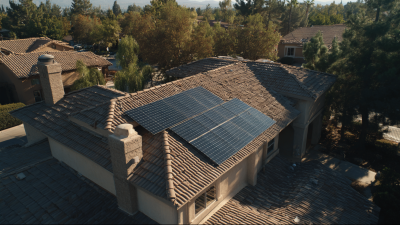ALL PRODUCTS
- Solar Panel
- Hybrid Inverter
- Lithium Battery
GSB SOLAR LITHIUM BATTERIES
- Gel Battery
- Solar Street Lights
- Pump Inverter
As the world pivots towards sustainable energy solutions, the role of solar power batteries is becoming increasingly pivotal. According to a report by the International Energy Agency (IEA), solar power production is expected to quadruple by 2040, which means that the demand for efficient and reliable solar power batteries will surge correspondingly. These batteries not only store energy generated from solar panels but also enhance the reliability of renewable energy systems, making them indispensable for achieving energy independence. A study from BloombergNEF highlights that the global market for solar power batteries could reach a staggering $620 billion by 2030, driven by the rising adoption of electric vehicles and green energy initiatives.

As we explore the future of solar power batteries, it is essential to consider the innovations and strategies that can optimize their performance and integrate them into our daily lives for a more sustainable future.
As we navigate the complexities of achieving net-zero emissions by 2050, the role of solar power batteries becomes increasingly critical. These batteries serve as essential components in energy storage systems, enabling us to harness solar energy efficiently. They store excess energy generated during sunny days and release it during periods of low sunlight, ensuring a steady power supply and reducing reliance on fossil fuels.
Tips for effectively utilizing solar power batteries include investing in high-capacity storage solutions that can meet your energy needs, considering the integration of smart technology for efficient energy management, and regularly monitoring battery health to maximize lifespan. By prioritizing these practices, users can enhance the performance of their solar energy systems.
Moreover, advancements in battery technology, such as improved lifespan and charging efficiency, pave the way for more widespread adoption. By promoting initiatives that support research and development in this area, we can collectively strive towards a greener future. The adoption of solar power batteries is not just a step towards personal energy independence; it’s a significant leap towards a sustainable global energy framework.
The future of solar power batteries is increasingly shaped by significant technological innovations aiming to enhance their efficiency. Recent studies indicate that improvements in photovoltaic (PV) technology are pivotal. For instance, a comprehensive review presents that advancements in solar cell materials and designs have led to a notable increase in solar panel efficiency, with some new models surpassing 23% efficiency rates. This evolution not only reduces the cost of solar energy systems but also boosts the capacity of solar batteries to store energy effectively, making them more reliable for energy independence.
Moreover, as we approach 2025, the solar battery market is expected to see further breakthroughs. Reportedly, innovations such as lithium-silicon anodes and new electrolytes could enhance battery energy density by over 30%. This means that solar batteries won’t just store more energy; they will also charge faster and last longer. The integration of these advanced technologies ensures that solar batteries remain competitive, contributing significantly to sustainable energy solutions by enhancing the grid's reliability and facilitating smoother transitions to renewable energy across diverse applications.

The solar battery industry is poised for remarkable growth, driven by increasing demand for renewable energy and advancements in battery technology. According to a recent report by Allied Market Research, the global solar battery market is expected to reach approximately $19.9 billion by 2030, boasting a compound annual growth rate (CAGR) of 18.3% from 2022 to 2030. This surge is attributed to the rising installation of solar panels across residential and commercial sectors, combined with the growing necessity for effective energy storage solutions. As countries aim to meet their sustainability goals and reduce carbon emissions, solar batteries will play a crucial role in transitioning to cleaner energy sources.

Tips for consumers considering solar battery options include evaluating the specific energy needs of your home or business. Analyzing your energy consumption patterns can help determine the appropriate battery capacity required to maximize efficiency and cost savings. Additionally, stay informed about technological advancements in battery systems, such as lithium-ion and solid-state options, as these can significantly improve performance and longevity.
By 2030, we can expect significant innovations in energy density and charging speed within the solar battery landscape. As manufacturers focus on reducing costs and enhancing efficiency, consumers will benefit from more accessible and effective energy storage solutions. Following market trends and potential developments will ensure you are well-prepared to make informed investments in sustainable energy alternatives.
As the world shifts toward sustainable energy, the cost-effectiveness of solar batteries compared to traditional energy storage solutions has come under scrutiny. Solar batteries, such as lithium-ion systems, are increasingly being recognized for their ability to store excess energy generated by solar panels. In contrast, traditional energy storage methods, like pumped hydro or fossil fuel backup systems, involve higher operational costs and a greater environmental footprint.
When considering the transition to solar batteries, it’s essential to conduct a thorough cost-benefit analysis. **Tip 1:** Calculate not just the initial investment but also the long-term savings on energy bills. Solar batteries can significantly decrease reliance on the grid, yielding substantial financial benefits over time. **Tip 2:** Evaluate potential incentives and rebates available in your area for solar battery systems; these can greatly affect the overall cost and return on investment.
Furthermore, reliability plays a crucial role in energy storage decisions. While traditional systems may offer familiarity, solar batteries boast advancements in technology that enhance their efficiency and lifespan. **Tip 3:** Research various brands and models, considering not only upfront costs but also warranty periods and customer reviews. Making an informed choice can lead to better performance and satisfaction in the long run.
| Energy Storage Type | Initial Cost (per kWh) | Lifespan (years) | Cycle Efficiency | Maintenance Cost (per year) | Environmental Impact |
|---|---|---|---|---|---|
| Solar Batteries | $400 | 10 | 80% | $50 | Low |
| Traditional Lead-Acid Batteries | $150 | 3-5 | 70% | $100 | Medium |
| Lithium-Ion Batteries | $300 | 7-10 | 90% | $30 | Low |
| Flow Batteries | $600 | 10-15 | 75% | $20 | Very Low |
As the demand for renewable energy continues to grow, integrating solar power batteries into smart grid systems presents both challenges and opportunities. One of the primary hurdles is interoperability; ensuring that various battery systems can communicate effectively with existing grid infrastructure is vital. Utility providers and technology developers must focus on creating standard protocols that facilitate seamless integration and enhance the grid's overall reliability and efficiency.
Tip: When considering solar battery systems, research products that comply with established industry standards to ensure compatibility with smart grid technologies.
Another significant challenge is energy management. Balancing the energy produced by solar panels with consumption patterns requires sophisticated software and algorithms. This technology must predict energy demand and optimize the use of stored solar power, reducing reliance on non-renewable energy sources during peak consumption times.
Tip: Implement energy monitoring systems in your home or business to better understand your consumption patterns and maximize the efficiency of your solar battery setup.
Addressing these challenges is crucial as we advance toward a more sustainable energy future, paving the way for widespread adoption of solar power batteries within smart grid systems.






